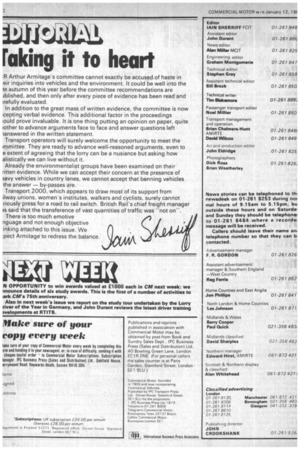Taking it to heart
Page 4

If you've noticed an error in this article please click here to report it so we can fix it.
R Arthur Armitage's committee cannot exactly be accused of haste in eir inquiries into vehicles and the environment. It could be well into the te autumn of this year before the committee recommendations are .11)fished, and then only after every piece of evidence has been read and irefully evaluated.
In addition to the great mass of written evidence, the committee is now :cepting verbal evidence. This additional factor in the proceedings iould prove invaluable. It is one thing putting an opinion on paper, quite 'other to advance arguments face to face and answer questions left lanswered in the written statement.
Transport operators will surely welcome the opportunity to meet the immittee. They are ready to advance well-reasoned arguments, even to e extent of agreeing that the lorry can be a nusiance but asking how alistically we can live without it.
Already the environmentalist groups have been examined on their ritten evidence. While we can accept their concern at the presence of avy vehicles in country lanes, we cannot accept that banning vehicles the answer — by-passes are.
Transport 2000, which appears to draw most of its support from ilway unions, women's institutes, walkers and cyclists, surely cannot riously press for a road to rail switch. British Rail's chief freight manager is said that the transference of vast quantities of traffic was ''not on". There is too much emotive nguage and not enough objective inking attached to this issue. We :pect Armitage to redress the balance.












































































































